Scientists Speak Out on Climate: Is Anyone Listening?
In the light of recent varied efforts to focus public attention on the risks of climate change, we asked Earth Institute scientists what they want the public to understand about the issue and how they see their roles.
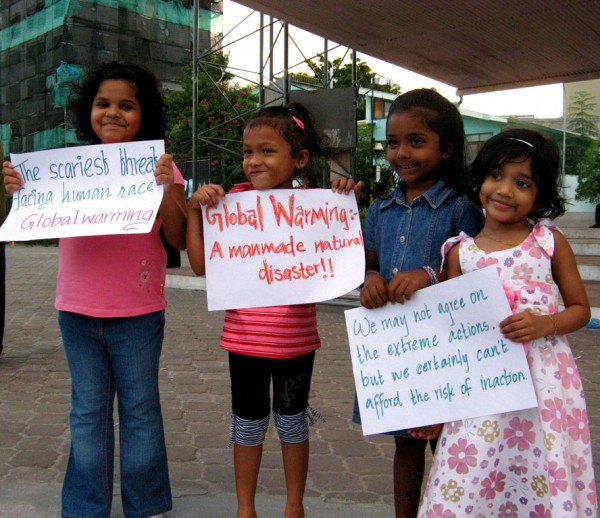
According to the latest Gallup Poll, only about one-third of Americans are greatly worried about global warming. The scientists who study climate, however, are generally far more concerned about the future risks we face from climate change. The recent release of the U.N.’s Intergovernmental Panel on Climate Change (IPCC) report warns that climate change is already here, with effects that will steadily worsen unless greenhouse gas emissions are curbed.
More and more scientists are speaking out in an attempt to bring their findings to the public’s attention. The American Association for the Advancement of Science’s new What We Know initiative aims to communicate to the public the reality, risks and potential solutions of climate change. The effort by scientists has finally been bolstered as well by the efforts of some politicians. In March, Senate Democrats pulled an all-nighter to discuss climate change, and President Obama launched Climate.Data.gov to help local communities understand and prepare for it.
Scientists have also joined forces with the firepower of Hollywood and concerned celebrities in Showtime’s eight-part documentary series, Years of Living Dangerously, premiering April 13. The series is produced by James Cameron (Avatar, Titanic), Jerry Weintraub (Karate Kid, Oceans 11), and Arnold Schwarzenegger; and features celebrities such as Harrison Ford, Jessica Alba, Matt Damon, Thomas Friedman and Mark Bittman.
James Hansen, former director of the NASA Goddard Institute for Space Studies and adjunct professor of earth sciences at Columbia University’s Earth Institute, and Radley Horton, climate scientist at the Center for Climate Systems Research at Columbia University, are science advisors on the Showtime series. Horton is also featured in one of the episodes. Scott Miller, a sustainability consultant at Mind Click Global who received his MS in sustainability management from Columbia and co-chairs the Earth Institute’s Leadership Council, is featured in one episode.
In light of these efforts to get people to take climate change more seriously, we asked Earth Institute climate scientists what they wish the public understood about climate change and how they view their own roles.
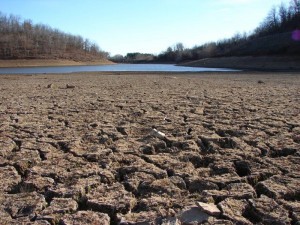
“Climate change is already happening here in the U.S.,” said Ben Orlove, co-director of the Center for Research on Environmental Decisions. And small changes in average conditions, such as sea level rise or temperature, can result in large changes in the frequency of extreme events so detrimental to society, such as coastal flooding or heat waves, explained Horton. People need to understand that the climate system is very sensitive to perturbation, and that “man’s current impact on the climate system is far greater than any of the natural influences currently operating,” said Maureen Raymo, a research professor at Lamont-Doherty Earth Observatory.
Moreover, the greenhouse gases we have already put into the atmosphere will remain there for hundreds of years and continue to accumulate.
“Everything we do today will stay there and affect our children and generations to come,” said Xiaojun Yuan, a research scientist at Lamont-Doherty. “If we don’t act now, we will make this problem much worse for them. … But if we can slow the process down by taking some actions now, we will give society time to adapt to the changes and develop some strategies and technologies to deal with them.”
The public also needs to realize that the further we push the climate system, the greater the possibility of abrupt changes and unforeseeable consequences if we reach certain thresholds, said Peter Schlosser, director of the Columbia Climate Center and a professor of earth and environmental sciences at Lamont. The loss of Arctic sea ice and its ability to reflect heat from Earth back into space, could lead to increased global warming. The loss of land ice in Antarctica and Greenland could result in faster and greater sea level rise. Climate models are incapable of capturing these processes or analyzing the risks they pose.
Schlosser also feels the public does not have enough information to understand the climate system, and as a result, often confuses it with weather.
“We have to get across to the public that the climate system is very complex, and that trends need to be observed over many years to decades,” he said.
Lisa Goddard, director of the International Research Institute for Climate and Society, also wishes the general public had a better appreciation of climate variability—how we can range from an unusually warm winter to a bitter cold one, for instance—and feels the climate change issue is often presented in terms that are too black and white.
“If global temperatures aren’t on their steady upward march, getting warmer and warmer every single year, then [people think] climate change must not be happening,” she said. “Anything that deviates from that straightforward message is either evidence against climate change or is backsliding on the part of the climate community.”
For his part in Years of Living Dangerously, Horton helped high school students on Staten Island who had experienced Superstorm Sandy better understand the variations in climate.
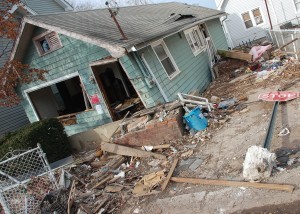
They discussed the links between climate variability and climate change, and the ways in which Sandy might have been impacted by climate change. While the superstorm cannot be directly attributed to climate change, sea level rise due in part to climate change did exacerbate coastal flooding, and there is sound evidence that a warming ocean can make storms stronger.
The role of the climate scientist
Most of the scientists we talked to agreed that their primary role is to do the science well, to understand the climate system and the consequences of anthropogenic climate change. “Our role as scientists is to push the frontier of knowledge outward, pushing back the realm of the unknown and uncertain,” said Raymo. This includes presenting the facts and findings rationally and authoritatively to both the scientific community and the public.
“Because we are funded by the taxpayer, scientists have a responsibility to tell people what you find and what your field has found, to help them understand the issues and provide a context for all the information,” said Gavin Schmidt, a physical scientist at NASA Goddard Institute for Space Studies. “…Most people don’t get it because the media does a bad job of explaining complex issues.”
Scientists also need to communicate the dangers we face and offer solutions. “Our role is to think of possible actions to counter the negative impacts of climate change,” said Schlosser. “How can we mitigate and adapt and respond to it to minimize the risks to our way of life?”
Horton agrees that it’s important to speak out about the dangers of climate change and the options for reducing greenhouse gases and adapting to the changes ahead. “But in discussing policy,” he said, “scientists need to acknowledge that they’re speaking as individuals with their own set of values.” When offering solutions, they need to distinguish between their roles as professional scientists and as private citizens.
Goddard added, “I commonly see people that are not climate scientists, who know a little bit about climate science, espousing on that…and it’s inappropriate.”
The blurring of the line between the professional and private citizen is an essential feature of the denialists’ intellectual dishonesty, according to Adam Sobel, a professor of applied physics and applied mathematics in the Department of Earth and Environmental Sciences at Columbia. “They start from values and deduce their position on the science from there,” he said.
Schmidt spends a lot of time explaining the practice of science, because “people don’t understand how science works 99 percent of the time. …They need to know that science is a set of ever better hypotheses about the world. It’s exploratory, never fixed.” As a result, scientists will not agree 100 percent of the time, something climate denialists often use to cast doubt on findings or as justification not to take action.
What will move the issue forward
Many people concerned about climate change have an implicit belief that if people just knew the right science, they would all make the same reasonable decisions. But facts do not change people’s basic values, said Schmidt; and coming to a consensus about what actions to take is difficult because of profound differences between people’s ideas about freedom, responsibility, equity and other issues.
Because people have such diverse values and backgrounds, most of the scientists feel it is important to attack the issue on a variety of fronts. Presenting information on climate change from varied entities such as the American Association for the Advancement of Science, politicians, and Showtime, gives the public more opportunities to find a source or perspective they can respond to. “The more messages out there, the better,” agreed Yuan. “People will trust the message more if they hear it from different channels.”
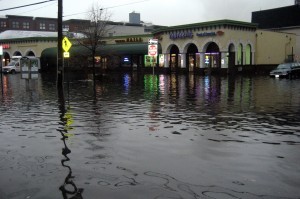
Nonetheless, most of the scientists agreed with Yochanan Kushnir, a senior scientist at Lamont who said, “Public opinion will sway toward action in a significant way only when and where the impact of change becomes obvious, such as in the case of coastal regions as sea level rises, or in the dry zones when continuous droughts hit.” Hopefully, science can help focus the public’s attention on the risks before disasters strike.
Arnold Gordon, an earth and environmental sciences professor at Lamont, thinks it would help to utilize “’Mad Men’ advertisers, those skilled in reaching the public to make them want stuff that they don’t need. … Only now get them to get across a message vital to people and their families for their future generations’ well being.”
Scientists can help get the message across by talking to everyone they encounter, at every possible opportunity, said Yuan, “Ninety percent of scientists only talk to other scientists.”
An example of how effective spreading the word can be was Yuan’s own experience on a cruise to the Antarctic organized by the Antarctic Forum for an elite group of businessmen, economic and religious leaders from China, who normally never have an opportunity to talk with scientists. The cruise included sightseeing, arts, lectures, debates, brainstorming and more. After 10 days, Yuan was surprised to see that the messages about the environment and climate were getting through and that these CEOs, who have the power to influence their companies, became “passionate about taking care of the earth.” She believes this is a model that could be applied elsewhere.
Targeted messages to particular groups are most effective, said Orlove. “Tell people in a coastal area to deal with sea level rise, and in the interior to deal with drought,” he recommended. “And eventually these different groups, having begun to take action, can coalesce into a larger, more effective force.”
Rather than trying to influence the opinion of the masses, educating and communicating with smaller communities of the science and policy elite who have influence ultimately reap more benefits, according to Mark Levy, deputy director of the Center for International Earth Science Information Network. Similarly, Goddard urges climate scientists to address the influencers in communities—the minister, mayor or Boy Scout leader.
“Getting the people who have the respect and the voice to understand what the issues are and how it affects their community, and to what extent these issues are in line with what they’re trying to accomplish, makes a lot of sense,” she said.
In a capitalist society, helping businesses connect the dots between financial gain and reducing their CO2 emissions (through energy and resource efficiency) is key, according to Scott Miller. Featured in Years of Living Dangerously as part of the Environmental Defense Fund’s Climate Corps, Miller was tasked with identifying opportunities for Caesar’s Entertainment in Las Vegas to reduce its carbon emissions through energy efficiency and cost reduction. He analyzed all the pool pump systems and lighting and presented new strategies to the CEO of Caesar’s, followed by Showtime throughout the process. Caesar’s is now committed to implementing his recommended energy efficiency measures across all eight of their properties.
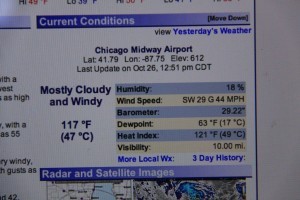
Richard Seager, a research professor at Lamont, also believes the answer lies with economics, since many people are opposed to doing anything about climate change because they are profiting from the fossil fuel economy.
“The way forward is to work on how to make the economic transition to a post-carbon world that recognizes resource and ecological limits—globally, not just in the U.S.— and how to develop the coalition that will win this battle.” he said. “The problem is that no one in the political realm, in the U.S or Europe or anywhere, is mapping out a transition to a post-carbon world that appears convincing, feasible and attractive to a majority of the population.”
Transitioning out of a fossil fuel economy seems daunting, but Sobel noted that many people were once also heavily invested in a slave economy, and that changed. Climate change “needs to become a moral issue at the level of civil rights, apartheid and slavery…not just something in the science pages,” he said.
Miller feels strongly that the public needs to grasp the moral implications of climate change. “The wealthier nations have an absolute moral obligation to address climate change immediately by reducing their greenhouse gases. It is a sad and terrible fact that the most vulnerable and poorest nations who produced the least greenhouse gases are the people most adversely affected by climate change.”
“The U.S. and other developed countries have the luxury to debate climate change mainly because there is a perception that there will be enough resources to cope and recover from major and repeated climate shocks,” said Katia Fernandes, a climate scientist at the International Research Institute for Climate and Society. In the U.S., we can afford the climate bandaids such as seawalls, bottled water and imported food that poorer nations cannot, said Miller. In many of these other places, the debate about climate change is over—they are already living with it, and in some cases, being forced to relocate by rising sea levels, erosion or drought.
Most of the scientists believe the debate here will eventually end, the necessary cultural change will happen and people will become motivated to act as the impacts of climate change become more obvious and its effects are felt more acutely. Perhaps too late, the impetus to act will also come as the generations shift, and the young, who are forced to confront the new reality they face, take their place at the helm.
